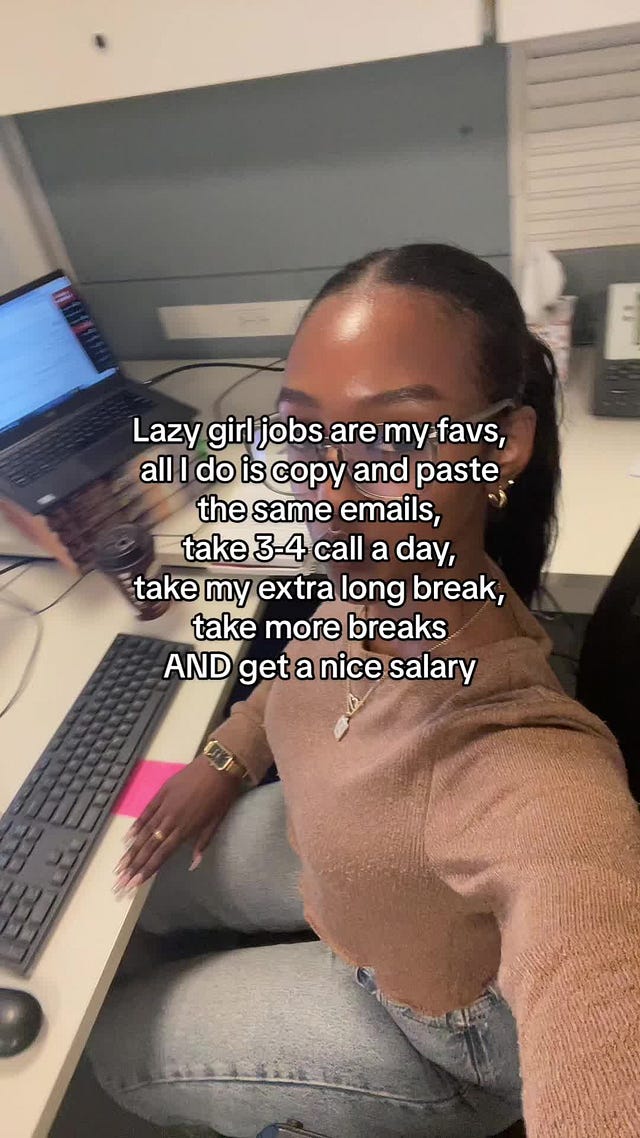The problem with 'lazy girl jobs': they don't exist
Trading out your high-pressure gig for a 'lazy girl job' is being held up as a way to tackle overwork and burnout. It's not.
Describe an easy job, one that promises piles of money in exchange for little toil and low levels of stress, give it a catchy name with the word ‘girl’ in it, then post a video documenting a brief moment of said job; perhaps of you typing an email while wearing a latte-toned loungewear set.
This is how you create a work trend. Soon people will declare on TikTok that they’re entering their ‘lazy girl job era’. Someone else will make a sound that outlines the definition of the ‘lazy girl job’. Publications will cover the lazy girl job. They will ask experts why the trend is good or bad. Someone will declare the trend problematic. A boomer will be invited to debate the topic and will say that this is further evidence that young people these days don’t actually want to work. The millennial will say we’re burnt out. Back on TikTok, influencers will say *this* is how you actually get a lazy girl job, and we will all watch because ‘lazy girl job’ isn’t just a catchy term, it’s also a deeply appealing one.
Of course this happens. Of course we - the tired, overworked, fed up, struggling for money, disillusioned people - are keen on something that could answer our work woes.
Unfortunately, there’s a problem: the lazy girl job doesn’t actually exist. The ‘dream job’ may be dead, but in its place is another fantasy.
What *is* a lazy girl job? Even the videos purporting to tell you how to get one don’t get into the specifics. It’s one that you can ‘quiet quit’, that allows you to clock out and switch off, that involves some sort of low-stress data entry or sending of emails that you can do from home.
A lazy girl job seems to be defined primarily by what it’s not. It’s not the kind of job that you think about all the time. It’s not stressful. It’s not high-stakes. It doesn’t have a lot of pressure on your performance. Or rather a lazy girl job is defined by its difference to your current role. Your current job is bad, high-effort, misery-inducing. The lazy girl job is what you could do instead. But, again, it’s fantasy. It’s something to long for, but not a thing you an actually do.
That’s because the reality of the fantasy lazy girl job that’s not your current, bad job, is that it will be hard and irritating in other ways. When you’re working in a creative field and spend much of your time thinking and planning, you consider packing it in and going back to retail, or perhaps making things with your hands. You forget about the bone-deep ache in your legs at the end of your shift, the sweat pooling where your back meets your bum. When your job is too high-pressure, too hurried, you consider taking a step down, going for something (but what? Who knows) in an office that will just involve a few emails and Excel sheets. You don’t realise the strain of feeling your brain atrophy from lack of exertion, the building irritation at yet another meeting about a goal that feels entirely pointless to achieve.
The lazy girl job trend is pure romanticisation of any job that isn’t your own, that overlooks the hard truth that as it is, all work is, well, work, whether that’s the effort of socialising, the effort of staying somewhat engaged, the effort of meeting deadlines or of knowing that it doesn’t matter if you slow to a standstill.
Don’t take all this as me declaring that all work is intrinsically bad and we are doomed to toil without any let-up well into our 80s. Instead, see it as a hopeful rallying cry. Our endless seeking of something to press the brakes on our workloads - quiet quitting! bare minimum mondays! lazy girl jobs! - shows that there is a major problem with our work culture. The bad news is that none of the sticking plasters we’re being sold are an actual solution. The good news is that there *is* a solution, and that’s a radical overhaul of what work looks like.
It’s also, on an individual level, an internal change: not hoping that the next job you get will be sufficiently ‘lazy’ that you’ll fix your overwork habits, but by reassessing what you actually want from work, and how you’re going to get it. Perhaps a lazy girl job isn’t actually a job, but more of a mindset. If you can let go of that internal drumbeat that tells you you have to achieve, you have to stay late, you can’t take your foot off the gas, any job can be a little better.
A lazy girl job is not a panacea, no matter how appealing it may seem at first glance. The work to change work is quite a bit more complex.
If you don’t fancy doing that work though, here’s an exception to all of the above. There are indeed lazy girl jobs: they’re high-level CEOs and amorphously named directors and executives who are so established in their roles that they can get away with doing fuck all. Just land yourself one of those and you’ll be fine.






Adored this one Ellen. About changing your mindset rather than looking for a new job.